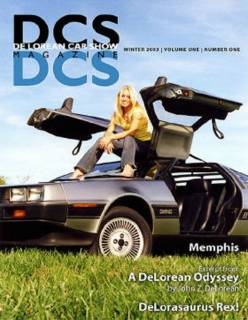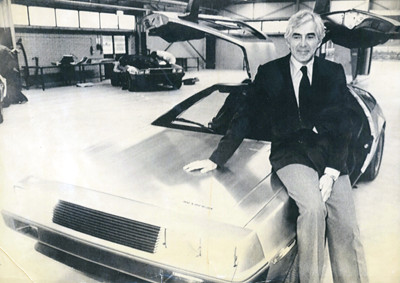John DeLorean, R.I.P (Rocking Revitalization Part II)

Delorean Car Show magazine cover.
 Unbeknownst to me as I was writing the entry yesterday about Bob Lutz, General Motors, customer responsiveness, and weblogs, in which I mentioned John DeLorean and his "memoir" about working for General Motors, On A Clear Day You Can See General Motors, the day's newspapers were running his obituary.
Unbeknownst to me as I was writing the entry yesterday about Bob Lutz, General Motors, customer responsiveness, and weblogs, in which I mentioned John DeLorean and his "memoir" about working for General Motors, On A Clear Day You Can See General Motors, the day's newspapers were running his obituary.Like The Ugly American, a famous book about (misguided) US foreign policy (and still relevant today decades after it was first published), DeLorean's book, about the failures of the prototypical American corporation to be responsive and able to change, has had a lot of impact upon me, and how I think about organizations.
(Other books that I read back then that still shape my thinking include Social Psychology of Organizations, Strategic Marketing for Not-For-Profit Organizations, Strategic Marketing for Nonprofit Organizations, Change; Principles of Problem Formation and Problem Resolution, Human Scale by Kirkpatrick Sale, The Whole World is Watching by Todd Gitlin, and a journal article, "The Economic Advantages of Backwardness" by Alexander Gerschenkron.)
Every major newspaper had obituaries yesterday (and last Friday's Escape section in the New York Times had a feature about a DeLorean car repair shop in "Putting a car of the future back on the road.")
DeLorean had a lot of successes in his career, especially for creating muscle cars that appealed to young adults in the same way that Lowriders appeal to Latino youth today. In 1961 he became GM's chief engineer (top automotive engineer for the entire corporation).

The Washington Post writes:
"Mr. DeLorean, the son of an autoworker, reached the executive ranks of General Motors Corp. with an astonishing series of successes that revolutionized the industry. He attributed his rise largely to an acute cultural awareness missing in the older executives he saw around him, men he once described as "sitting behind [a] desk, wearing a pair of those old high-top leather shoes and packing a big wad of cigars" in their shirt pockets.
His winning formula was strikingly simple and hip: Listen to rock and roll radio. From there, he said, one could gauge what young buyers wanted, what trends would develop. 'It's the cheapest education you could get,' he once said.
He won acclaim by introducing sports-car sexiness to conservative Pontiac with his GTO muscle car in the 1960s. He also brought Pontiac its first compact vehicle, predicting a trend to more fuel-efficient models. Ceaselessly inventive, he was credited with creating the overhead-cam engine, concealed windshield wipers, the lane-change turn signal, vertically stacked headlights, racing stripes and an emphasis on cockpitlike driver consoles. He said he had more than 200 patents.
Mr. DeLorean conveyed a manic, restless energy at GM, where he was viewed as Chevrolet's savior after a period of extensive decline for that brand. But his rise never seemed to satisfy him, and instead he felt more constricted by bosses who he said were out to get him and deliberately stymied his plans to improve cars and increase sales."
I suppose the truth is somewhere in the middle, and his attempt to create the DeLorean Car Company was in large part a failure, despite the cult status of the car, which has been extended by its being featured as a centerpiece in the successful Back to the Future films.
Even so, I believe that identifying problems and issues is as important as figuring out how to solve them. Sometimes the skill at one doesn't translate to skill at the other.
Had GM officials picked up, read, studied, reacted, and responded to DeLorean's book, maybe today the state of the corporation would be somewhat and substantively different.
Meanwhile, GM projects a loss of about $1 billion, non-U.S. automakers continue to expand, in the U.S. and elsewhere, and the Chinese automobile industry is gearing up to enter the U.S. market...



0 Comments:
Post a Comment
<< Home